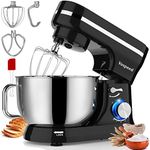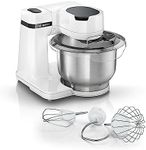Buying Guide for the Best Dough Mixers
Choosing the right dough mixer can significantly enhance your baking experience, whether you're a home baker or a professional. The right mixer will save you time and effort, ensuring consistent results every time. When selecting a dough mixer, consider the types of dough you plan to make, the volume of dough you typically work with, and the space you have available in your kitchen. Understanding the key specifications will help you make an informed decision that best suits your needs.CapacityCapacity refers to the amount of dough a mixer can handle at one time. This is important because it determines how much you can make in a single batch. Mixers generally range from small capacities suitable for home use, around 3-5 quarts, to larger capacities of 10 quarts or more for commercial use. If you bake occasionally or in small quantities, a smaller capacity mixer will suffice. However, if you frequently bake large batches or have a small business, a larger capacity mixer will be more efficient.
PowerPower is measured in watts and indicates the strength of the mixer's motor. A more powerful motor can handle heavier doughs and larger quantities without straining. Mixers with lower wattage, around 250-500 watts, are suitable for light doughs and occasional use. For frequent baking or handling heavy doughs like bread, a mixer with 600 watts or more is recommended. Consider your typical baking tasks to determine the appropriate power level for your needs.
Speed SettingsSpeed settings allow you to control how fast the mixer operates, which is crucial for different stages of dough preparation. Most mixers offer multiple speed settings, ranging from slow for kneading to fast for whipping. Basic models may have 3-5 speeds, while more advanced ones can have up to 10 or more. If you need versatility for various recipes, opt for a mixer with a wider range of speed settings. For simple tasks, fewer speeds may be sufficient.
AttachmentsAttachments are additional tools that come with the mixer, such as dough hooks, beaters, and whisks. These are important because they expand the functionality of the mixer, allowing you to perform different tasks like kneading, mixing, and whipping. Basic mixers may come with just a few attachments, while more advanced models offer a variety of options. Consider what types of baking you do most often and choose a mixer with attachments that will be most useful for those tasks.
Build QualityBuild quality refers to the materials and construction of the mixer, which affect its durability and longevity. Mixers made with metal components tend to be more durable and stable than those made with plastic. This is important if you plan to use the mixer frequently or for heavy-duty tasks. If you need a mixer for occasional use, a model with more plastic parts may be sufficient. For regular, heavy use, invest in a mixer with a robust build.
Ease of CleaningEase of cleaning is an important consideration, as dough mixers can be cumbersome to clean after use. Some mixers have dishwasher-safe parts, which can save time and effort. Others may have a design that minimizes crevices where dough can get stuck. If you value convenience, look for a mixer with features that make cleaning easier. Consider how much time you are willing to spend on maintenance when choosing a mixer.





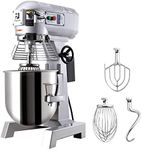
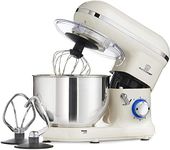
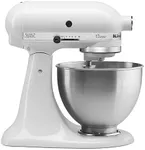


![Breville HeatSoft Electric Stand Mixer | 1000W | Softens Butter for Better Results | 10 Speeds | 5.2L Stainless Steel Bowl | Includes Whisk, Beaters & Dough Hooks [VFM027]](https://images-proxy.bestreviews.guide/Zqgsz7uan-B00VlQPJYdC0i6INo=/0x150/https://m.media-amazon.com/images/I/41O-9egqXUL._AC_CX679_.jpg)

